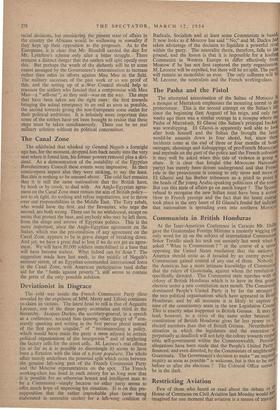The Canal Zone
. Revolutionary Council these events were impressive. In their comic-opera aspect also they were striking. to say the least. ut this is nothing to be amused about. The cold fact remains at it is still the same nationalism that the British have, by hook or by crook, to deal with. An Anglo-Egyptian agree- ment on the Canal Zone must remain the aim of British policy— not to sit tight, do nothing and refuse negotiations, nor to throw over our responsibilities in the Middle East. The Tory rebels, who would have the first, and the Bevanites, who urge the second, are both wrong. There can be no withdrawal, except on terms that protect the base, and anybody who may be left there, from the slings and arrows of Egyptian politics. This is the more important, since the Anglo-Egyptian agreement on the Sudan, which was the pre-condition of any agreement on the Canal Zone, appears to be in grave danger of breaking down. And yet, we have a great deal to lose if we do not get an agree- ment. We will have 80,000 soldiers immobilised in .a base that will have become useless. What indeed can be done ? The suggestion made here last week, in the middle of Neguib's summer storm, of an Egyptian-commanded international force in the Canal Zone, with American participation (and dollar aid for the " battle against poverty "), still seems to contain the germ of the only possible solution.










































 Previous page
Previous page